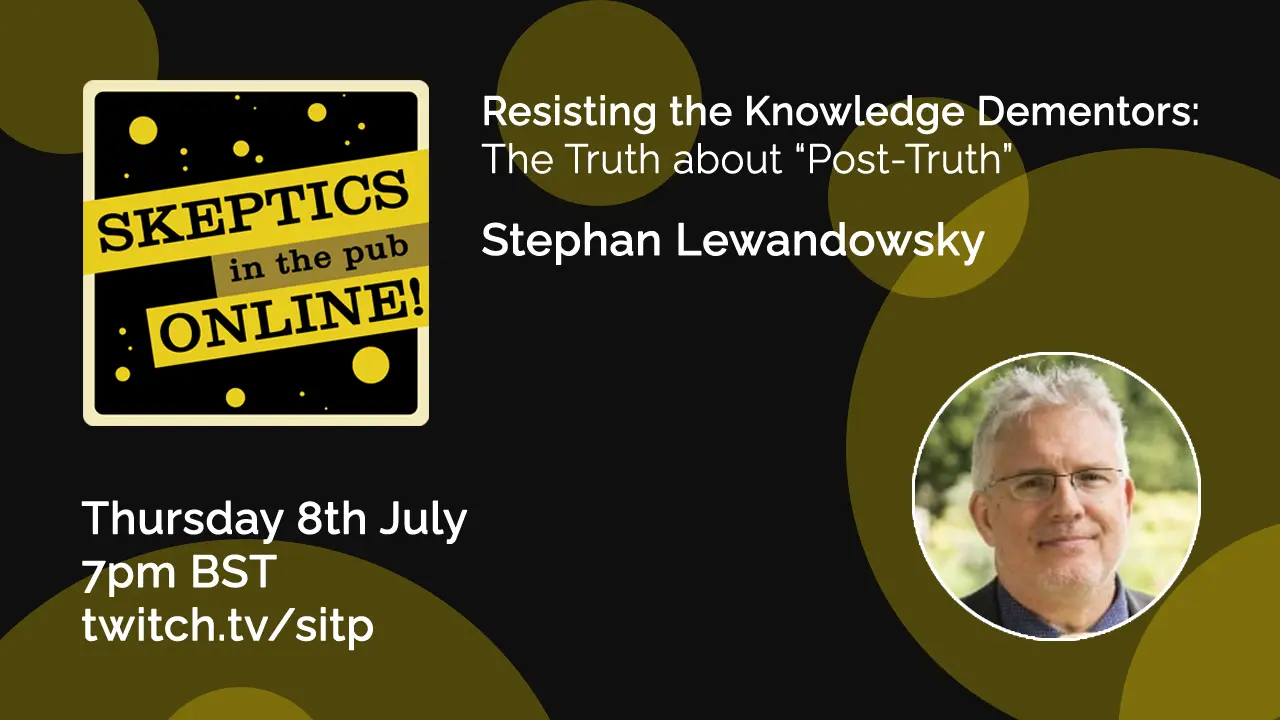Resisting the Knowledge Dementors: The Truth about “Post-Truth” – Professor Stephan Lewandowsky
This event will be online, on the Skeptics in the Pub Twitch channel.
We are said to live in a “post-truth” era in which “fake news” has replaced real information, denial has compromised science, and the ontology of knowledge and truth has taken on a relativist element. Professor Stephan Lewandowsky will argue that to defend evidence-based reasoning and knowledge against those attacks, we must understand the strategies by which the post-truth world is driven forward. He departs from the premise that the post-truth era arose spontaneously, arguing that it is the result of a highly effective political movement that deploys a large number of rhetorical strategies. He will focus on three strategies: the deployment of conspiracy theories, the use of “micro-targeting” and “bots” online, and agenda-setting by attentional diversion, and present evidence for the existence of each strategy and its impact, and how it might be countered.

Professor Stephan Lewandowsky is a cognitive scientist at the University of Bristol. He was an Australian Professorial Fellow from 2007 to 2012, and was awarded a Discovery Outstanding Researcher Award from the Australian Research Council in 2011. He held a Revesz Visiting Professorship at the University of Amsterdam in 2012, and received a Wolfson Research Merit Fellowship from the Royal Society upon moving to the UK in 2013. He was appointed a Fellow of the Academy of Social Science (UK) and a Fellow of the Association of Psychological Science in 2017. In 2016, he was appointed a fellow of the Committee for Skeptical Inquiry for his commitment to science, rational inquiry and public education. In 2019, he received a Humboldt Research Award from the Humboldt Foundation in Germany. His research examines people’s memory, decision making, and knowledge structures, with a particular emphasis on how people update their memories if information they believe turn out to be false. This has led him to examine the persistence of misinformation and spread of “fake news” in society, including conspiracy theories. He is particularly interested in the variables that determine whether or not people accept scientific evidence, for example surrounding vaccinations or climate science. His interest in the cognitive implications of climate change, and the conflict between human cognition and the physics of the global climate, has led im into research in climate science and climate modeling. As a result of his work in climate science he was appointed Visiting Scientist at the CSIRO Oceans & Atmosphere laboratory in Hobart, Tasmania, in August 2017. He has published more than 220 scholarly articles, chapters, and books, including numerous papers on how people respond to corrections of misinformation and what variables determine people’s acceptance of scientific findings. (See www.cogsciwa.com for a complete list of scientific publications.) Professor Lewandowsky also frequently appears in print and broadcast media and has contributed nearly 90 opinion pieces to the global media on issues related to his research.
This event is being run by Skeptics in the Pub Online, a coalition of UK-based Skeptics groups. Formed as the Covid-19 epidemic brought our country to a standstill, we are working to deliver high quality online events focussing on science, reason, and critical thinking.